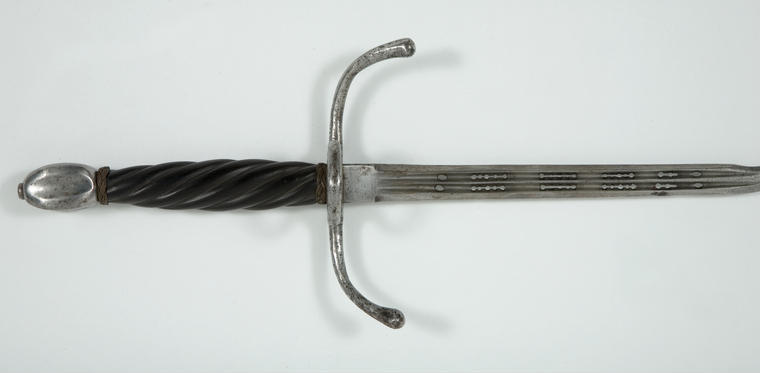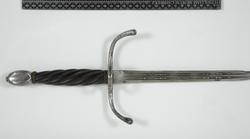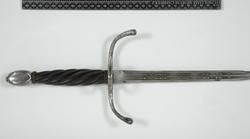Current Location: Gallery 31 (Armoury)
Maker(s)
Maker:
Unknown
Entities
Categories
Description
Rapier, with the proportions of a small sword. Oval pommel of rounded rectangular plan, each of the four faces being decorated with an indent of 1.9 cm (3/4") of the height of the pommel. Grip of oval section, of dark wood spirally fluted. Long arched quillons of circular section, quite thin, with a small ecusson. Forward ring-guard of the same section as the quillons. There is no knuckle-guard and no back-guard. Slender elegant blade of flat hexagonal section, forged in a close waved form. The upper part of the blade is of flat hexagonal section with two deep narrow fullers, which are pierced à jour, with a strong and deep shoulder below the iron hilt.
Legal notes
J.S. Henderson Bequest
Measurements and weight
Length: 98 cm
Acquisition and important dates
Method of acquisition: Bequeathed
(1933-03-16)
by
Henderson, James Stewart
Dating
17th Century, Early
Circa
1600
-
1630
Note
Swords with waved blades have been known for the past century by collectors as 'Flamberge' swords. This term has its origin in a number of sources. Firstly, one of the swords of Roland was, in legend, called Flamberge, by inference a large slashing sword. Secondly, in the 17th century Moliese, in one of his slays, used the expression 'Mettre Flamberge are vent', to describe the rather ridiculous flourish of a foppish character drawing of a small sword as if it were the great Flamberge itself. Thirdly, the name was associated with long French duelling swords of the mid-17th century, in which blades could be up to 183 cm (6ft) long.
The spectacular wavy edged blade is often called flamboyant and is uncommon. The grip is original but has lost its wire binding which would have completely covered it.
Western European
Components of the work
Grip
composed of
wood (plant material)
Hilt
composed of
iron (metal)
Length 16.5 cm
Blade
composed of
steel
Length 91.3 cm
Quillons
Width 14.5 cm
Blade At Hilt
Width 2.3 cm
Sword
Identification numbers
Accession number: HEN.M.224-1933
Primary reference Number: 18964
Old object number: PB 103
Stable URI
Audit data
Created: Saturday 6 August 2011
Updated: Monday 29 April 2024
Last processed: Tuesday 13 May 2025
Associated departments & institutions
Owner or interested party:
The Fitzwilliam Museum
Associated department:
Applied Arts









